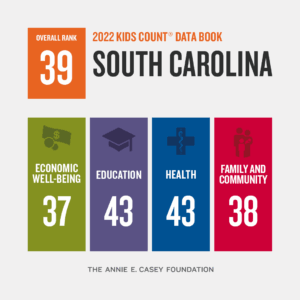COLUMBIA, S.C. — Twelve percent of children in South Carolina have reported experiencing depression or anxiety in 2020, a 55% increase from 2016, according to the 2022 KIDS COUNT® Data Book. The 50-state report of recent household data developed by the Annie E. Casey Foundation analyzes how children and families are faring.
 The annual ranking in the Data Book uses indicators from four key domains — economic well-being, education, health, and family and community — to produce an overall child well-being ranking for each state. South Carolina persistently sits near the lower fourth of states, with this year’s rank at 39.
The annual ranking in the Data Book uses indicators from four key domains — economic well-being, education, health, and family and community — to produce an overall child well-being ranking for each state. South Carolina persistently sits near the lower fourth of states, with this year’s rank at 39.
For the first time, this annual resource focuses on youth mental health, concurring with a recent public advisory by the U.S. surgeon general that current conditions amount to a youth “mental health pandemic.” The Data Book shows a national 26% increase in anxiety or depression reported among children ages 3 to 17.
South Carolina is one of six states that saw an increase of more than 50% in children’s anxiety or depression from 2016 to 2020. Other states with significant increases include Alaska, Arkansas, California, Massachusetts and South Dakota; the District of Columbia also saw such an increase.
 “The pandemic has taken a toll on everyone, and the heaviest burdens often fall on the shoulders of children who rely on others to meet their needs,” said Sue Williams, CEO of Children’s Trust, South Carolina’s member of the KIDS COUNT network. “We are in an ongoing emergency, and we need to invest in young people and families so they can navigate these challenges and recover stronger.”
“The pandemic has taken a toll on everyone, and the heaviest burdens often fall on the shoulders of children who rely on others to meet their needs,” said Sue Williams, CEO of Children’s Trust, South Carolina’s member of the KIDS COUNT network. “We are in an ongoing emergency, and we need to invest in young people and families so they can navigate these challenges and recover stronger.”
In addition, the child and teen death rate has increased by 13% in the past decade. According to the South Carolina Committee on Children, death by suicide is one of the leading causes of fatalities for children and youth ages 10-17.
The Annie E. Casey Foundation calls for lawmakers to heed the U.S. surgeon general’s warning and respond by developing programs and policies to ease mental health burdens on children and their families. They urge policymakers to:
- Prioritize meeting kids’ basic needs. Youth who grow up in poverty are two to three times more likely to develop mental health conditions than their peers. Children need a solid foundation of nutritious food, stable housing and safe neighborhoods — and their families need financial stability — to foster positive mental health and wellness.
- Ensure every child has access to the mental health care they need, when and where they need it. Schools should increase the presence of social workers, psychologists and other mental health professionals on staff and strive to meet the 250-to-1 ratio of students to counselors recommended by the American School Counselor Association, and they can work with local health care providers and local and state governments to make additional federal resources available and coordinate treatment.
- Bolster mental health care that takes into account young people’s experiences and identities. It should be trauma-informed — designed to promote a child’s healing and emotional security — and culturally relevant to the child’s life. It should be informed by the latest evidence and research and should be geared toward early intervention, which can be especially important in the absence of a formal diagnosis of mental illness.
As Children’s Trust develops its priorities for the upcoming 2023 legislative session of the General Assembly, the organization expects to focus on these issues.
The Data Book does share some positive outcomes for the Palmetto State. Most significantly, teen births have decreased by 56% since 2010, and there are 42,000 fewer children living in high poverty areas. There are also more parents employed full time and more teens who are attending school or working. “While these are positive outcomes, if South Carolina wants to improve its rank, it must work to keep pace with other states, which have more children attending preschool and which are reducing the number of babies who are born at low birth weight,” said Williams.
Organizations and individuals who want to work toward building better futures for children and families are encouraged to visit scChildren.org and sign-up for our mailing list.
Release Information
The 2022 KIDS COUNT® Data Book will be available at www.aecf.org. Additional information is available at www.aecf.org/databook. Journalists interested in creating maps, graphs and rankings in stories about the Data Book can use the KIDS COUNT Data Center at datacenter.kidscount.org.
About Children’s Trust of South Carolina
Children’s Trust is the only statewide organization focused on preventing child abuse and neglect in South Carolina. It leads and supports a network that shares our belief that all children should thrive, live in secure families and be surrounded by supportive communities. Children’s Trust coordinates the state’s efforts for the Strengthening Families Program; Triple P (Positive Parenting Program); S.C. Adverse Childhood Experiences Initiative; Maternal, Infant and Early Childhood Home Visiting; Child Abuse Prevention Month; and KIDS COUNT. For more information, visit scChildren.org.
About the Annie E. Casey Foundation
The Annie E. Casey Foundation creates a brighter future for the nation’s young children, youth and young adults by developing solutions to strengthen families, build paths to economic opportunity and transform struggling communities into safer and healthier places to live, work and grow. For more information, visit www.aecf.org. KIDS COUNT® is a registered trademark of the Annie E. Casey Foundation.
